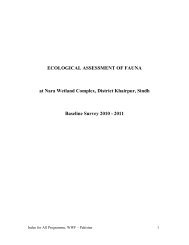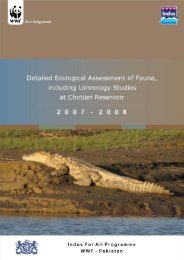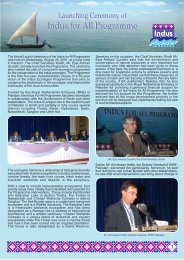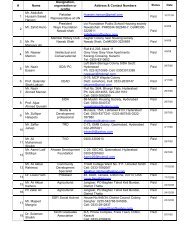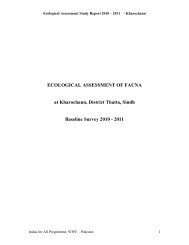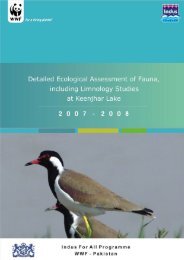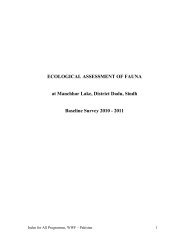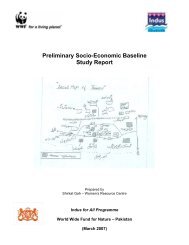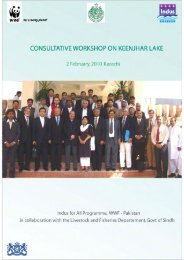Disclaimer note - WWF - Pakistan
Disclaimer note - WWF - Pakistan
Disclaimer note - WWF - Pakistan
You also want an ePaper? Increase the reach of your titles
YUMPU automatically turns print PDFs into web optimized ePapers that Google loves.
Detailed Ecological Assessment Report 2008 – Keenjhar Lake<br />
thousand families (with at least 8 to 10 family members per house<br />
hold) have migrated due to increasing poverty and land<br />
degradation..<br />
• Over-exploitation of resources: Mechanization of the fishing fleet and<br />
increased demand of seafood for export and domestic consumption have<br />
Led to increased fish production. However, inadequately managed, it has<br />
added a tremendous pressure on natural stocks. Some of the resources<br />
have been depleted; some are currently over-exploited while others are<br />
under threat of depletion. Shrimp stocks have been severely over-fished<br />
and a major decrease in landings of important shrimp species as well as a<br />
major reduction in the size of commercial species is now noticeable.<br />
Resources of lobsters have already been over-fished and annual landings<br />
have decreased from over 5,000 MT to about 800 MT. Resources of<br />
crabs, ivory shells and some fin-fishes have also shown signs of overexploitation.<br />
No stock assessment survey has been carried out for the last<br />
15 years, and the lack of information on the present status of various<br />
resources in shallow and offshore waters makes impossible the<br />
implementation of appropriate management measures. In the absence of<br />
regular monitoring of the resources, it is not possible to determine<br />
appropriate levels of exploitation of commercially important species.<br />
• Use of harmful fishing methods: Use of some harmful exotic gears<br />
began in the 1970s in coastal areas of Sindh. Two types of these gears,<br />
i.e. encircling net ‘katra’ and estuarine set bag net ‘bulo’ are considered<br />
extremely harmful to juvenile populations of commercially important<br />
species which abound in creek systems. A trawl shrimp net ‘gujja’ is also<br />
used in creek areas. These illegal gears have devastating effects on the<br />
local fauna and populations of commercially important species. Ineffective<br />
legislation and a lack of monitoring and surveillance facilities have<br />
resulted in a failure to prevent the spread of some of these fishing gears<br />
to the coast of <strong>Pakistan</strong>.<br />
• Lack of skilled human resources: Inadequate human resources and<br />
skills are found at two levels: within government structures, and (within<br />
fishing and fish farming communities. In most cases, fisheries institutions<br />
are inadequately staffed. Lack of trained manpower and suitable facilities<br />
in fisheries and aquaculture management organizations and research<br />
institutions are considered to be one of most important impediment to the<br />
development of both fisheries and aquaculture. This has consequences in<br />
terms of both the quality and the relevance of extension work carried out<br />
at the field level, with weak knowledge and experience is being passed on<br />
to fisher-folk and fish farmers.<br />
• Inadequacies in fisheries data: <strong>Pakistan</strong> faces problems in of<br />
inadequacy, reliability and accuracy of Fisheries and aquaculture data.<br />
There are a lot of inadequacies in the data collection system linked to<br />
poor sampling methods along the coastal areas. In most cases, fisheries<br />
data from Sindh are merely estimates and prone to personal judgments<br />
resulting in unreliable conclusions. Inadequacies in the statistical fisheries<br />
and aquaculture data collection system make the management of<br />
aquaculture, and inland and marine fisheries resources very difficult.<br />
<strong>WWF</strong> <strong>Pakistan</strong> – Indus for All Programme Page 77 of 188



